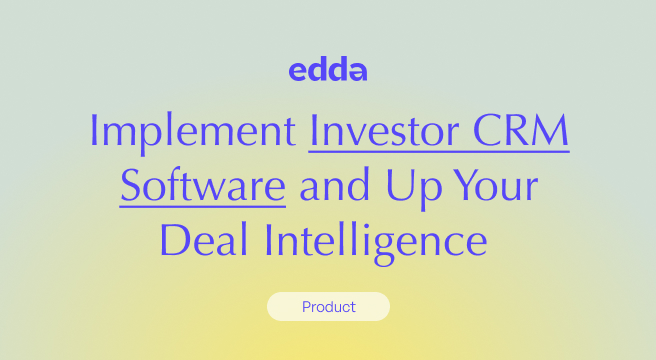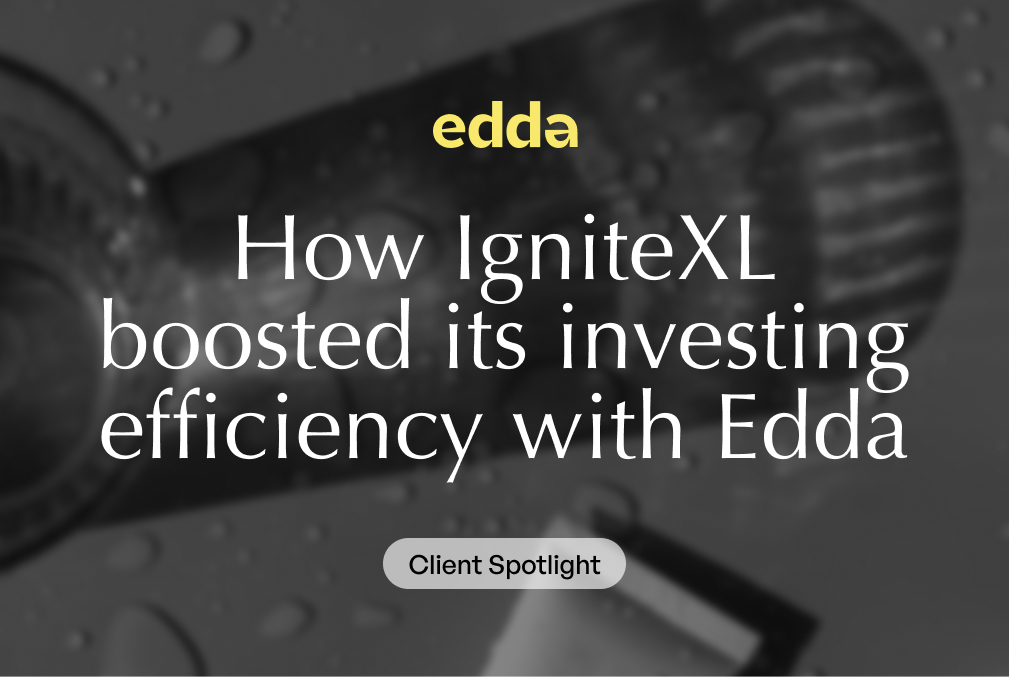Have you ever felt like you’ve missed out on a promising investment opportunity?
Does the idea of assistance with the amount of data you encounter in your investment process catch your attention?
A closer look at deal intelligence may be what you’re looking for.
This article walks you through how deal intelligence works as a strategic tool. It is a tool that leads to improved decision-making capabilities, enabling you to manage and fine-tune your deal flow efficiently.
Are you looking to boost market positioning for long-term success? We’ve got your back. Discover how the power of deal intelligence does the trick with Edda’s venture capital CRM
What is Deal Intelligence?
Deal intelligence refers to the strategic use of analytical tools and methodologies. These tools and methods enable investors to guide investment decisions from a deal’s initial sourcing to its final exit.
It involves collecting, analyzing, and interpreting vast amounts of data to provide deep insights. A process that helps investors understand markets, evaluate potential risks, uncover hidden opportunities, and make informed data-backed decisions.
Here are the key components of deal intelligence:
- Data Analysis: Get deep insights into investments’ financial health and growth potential. Deal intelligence data analysis offers a systematic review of financial statements, market trends, competitor performance, and industry developments.
- Predictive Analytics: Strategic decision-making and forecast alignment on your mind? Predictive analytics uses statistical models and machine learning algorithms to help investors anticipate future market behaviors and trends.
- Risk Management: Get a dose of helpful indicators to steer you in the right direction. Identify, assess, and mitigate potential investment risks with risk management across financial, operational, and market-specific domains..
- Enhanced Due Diligence: Verifying a company’s management credentials, legal compliance, and business model viability won’t do you wrong. Enhanced due diligence reduces investment uncertainties and risks.
Integrating deal intelligence into your investment strategy increases the accuracy of your evaluations and ensures a more strategic approach to managing and optimizing your firm’s portfolios.
Deal Intelligence: A Champion for Contemporary Challenges
Technological advances and the rise of startups have expanded venture capital and made it more data-centric. We’ve seen a surge of data and investment opportunities that call for better efficiency management tools.
The shift towards more significant early-stage investments also calls for dynamic systems capable of handling more substantial capital flows: promising opportunities need optimal allocation.
Venture capital firms diversify their portfolios beyond traditional tech sectors into emerging areas like sustainability and artificial intelligence, further complicating investment decisions. Diversification and the global expansion of VC funding into new markets like Asia and Europe are just a few examples of new terrain where deal intelligence can guide us confidently.
These expanding opportunities come with challenges. Understanding these challenges is vital to implementing deal intelligence solutions effectively.
Understand the hurdles you encounter. Here are some of the primary challenges faced by investment professionals today:
❗Information Overload
Data is abundant, the sheer volume of it overwhelming. How do you find what’s relevant? How do you sift through vast information without risking possible analysis paralysis or missing opportunities?
Best Practice:
Keep advanced data analytics tools that incorporate machine learning and natural language processing by your side. These technologies excel at filtering and prioritizing data and highlighting only the most relevant information for decision-making.
Integrate customizable dashboards into your systems, which can drastically improve efficiency. They provide quick access to critical data and minimize distractions from non-essential information.
Review and update your data filters and criteria regularly to keep these tools sharp. Reassure they remain aligned with your business’s evolving needs and objectives. This ongoing refinement process helps you adapt to changing data landscapes and double-check that your analytics tools continue to provide strategic value.
❗Rapid Market Changes
Markets today are more volatile than ever, influenced by global events, technological advancements, and shifting regulatory requirements. This rapid change can render previous analyses obsolete, so investors must constantly update their strategies and information.
Best Practice:
Given the nature of today’s markets, your investment strategies must be agile and adaptive. Engage regularly in scenario planning to prepare for various market conditions. Investing in systems that provide real-time data will enable you to adjust your strategies promptly as new information becomes available.
Establish a routine for frequent strategic reviews to recalibrate your approaches based on the latest market forecasts, ensuring your strategies stay responsive.
❗High Competition for Quality Investments
As more players enter the investment space, the competition for attractive investment opportunities heats up. This competition drives the need for innovative approaches to sourcing and securing deals, often within very narrow windows of opportunity.
Best Practice:
Focus on enhancing your network and establishing relationships to provide early insights into potential investments. Predictive analytics can help identify promising opportunities early. Developing exclusive channels for deal flow, such as partnerships with incubators or industry-specific groups, can allow access to investments before they reach the broader market.
❗Complexity of Due Diligence
Due diligence becomes increasingly complicated as companies develop new business models. Evaluating such entities requires deep insights, and a thorough understanding of niche markets and technologies is essential.
Best Practice:
As businesses transform, due diligence processes must also evolve. To streamline the process, implement automated tools capable of performing quick, comprehensive analyses of potential investments.
Put together expert teams with sector specialists, financial analysts, and legal experts to ensure that thorough due diligence leaves no stones unturned. Train in the latest due diligence techniques to maintain the quality and efficiency of these processes.
❗Integration of ESG Factors
There’s a growing need to integrate environmental, social, and governance factors into investment decisions. This integration can only work with new forms of data and analysis, further layering the investment process.
Best Practice:
With the increasing importance of ESG factors in investment decisions, standardizing ESG metrics keeps things consistent. Make specialized ESG data platforms work for you; they offer detailed insights and ratings to aid your evaluation process.
Need your integration to align with broader social and environmental goals? Are you looking to increase your commitment to responsible investing? Engage with stakeholders to gather insights on ESG practices.
Enhancing Deal Intelligence with VC CRM Systems
Customer Relationship Management systems boost deal intelligence. CMR systems transform how firms manage their relationships and data, turning every interaction into actionable insights that can dramatically streamline the entire investment lifecycle.
Here’s how:
- Integration of CRM with Deal Intelligence: CRMs, integrated with advanced analytics, help capture, manage, and analyze data from all interactions with potential and current investments. This integration provides a holistic view of each deal, enhancing strategic decision-making at every stage.
- Real-time Data Synthesis: Investor CRMs aggregate data in real-time, providing up-to-the-minute insights, a crucial element in a market where conditions change quickly. This capability allows firms to react rapidly to new information, adjusting their strategies to capitalize on emergent opportunities or mitigate unforeseen risks.
- Automated Workflows & Alerts: By automating routine tasks and setting up alerts for key events, CRM systems ensure that you never miss critical milestones or changes in investment conditions. This automation supports a more proactive approach to deal management, from initial sourcing to post-investment monitoring.
- Deep Relationship Insights: CRMs manage and analyze the complex relationships that define the investment industry. They track interactions, preferences, and history with each contact, whether potential leads, current investors, or influential advisors. This information is crucial for maintaining strong relationships and can be pivotal in deal sourcing and closure.
- Enhanced Due Diligence Capabilities: CRMs can enhance the due diligence process by providing detailed background information, historical data, and risk assessments. This perspective helps make informed decisions quickly and confidently.
- Driving Strategic Decisions with Predictive Analytics: Modern CRM platforms with predictive analytics forecast trends, potential market shifts, and investment outcomes. These insights allow you to position yourself strategically, often staying ahead of the game in securing and managing profitable investments.
- Integration with Other Systems: An effective CRM system integrates seamlessly with other operational tools, from financial management systems to compliance and reporting software. This interoperability reduces data silos, enhances accuracy, and speeds up information flow across the organization.
Deal intelligence-capable CMRs allow you to simplify processes and guide decision-making. This strategic advantage is necessary for firms aiming to maximize their returns and achieve long-term success.
Conclusion
Edda’s venture capital deal flow management software makes your investment process as smooth as possible, from deal sourcing to relationship management. It captures and organizes data and provides in-depth insights into relationships and market dynamics.
Key Features:
- Automated Data Management: Edda’s CRM automates data entry and organization, allowing you to focus more on analysis and less on administrative tasks.
- Relationship Intelligence: The system analyzes interactions within the investment network, uncovers hidden opportunities, and strengthens relationship management.
- Enhanced Due Diligence: CRM provides access to comprehensive data on contacts and companies and aids in more informed and faster due diligence processes.
Edda’s deal flow CRM clicks with other tools. It guarantees data consistency and enhances security, perfect for maintaining confidential investment information. Its features make it an invaluable asset for firms aiming to increase their deal intelligence and successful investment outcomes.
Ready to unleash these capabilities and perfect investment strategies? Explore Edda’s CRM to manage your investment processes and relationships on a new level.









